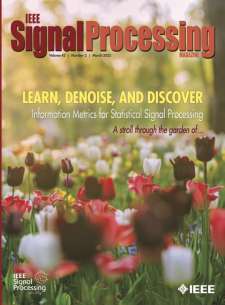- Our Story
- Publications & Resources
- Publications & Resources
- Publications
- IEEE Signal Processing Magazine
- IEEE Journal of Selected Topics in Signal Processing
- IEEE Signal Processing Letters
- IEEE Transactions on Computational Imaging
- IEEE Transactions on Image Processing
- IEEE Transactions on Information Forensics and Security
- IEEE Transactions on Multimedia
- IEEE Transactions on Signal and Information Processing over Networks
- IEEE Transactions on Signal Processing
- IEEE TCI
- IEEE TSIPN
- Data & Challenges
- Submit Manuscript
- Guidelines
- Information for Authors
- Special Issue Deadlines
- Overview Articles
- Top Accessed Articles
- SPS Newsletter
- SigPort
- SPS Resource Center
- Publications FAQ
- Blog
- News
- Dataset Papers
- Conferences & Events
- Community & Involvement
- Professional Development
- For Volunteers
- Information for Authors-OJSP
-
Home
Conferences Events IEEE Signal Processing Magazine IEEE SPL Article IEEE TIFS Article IEEE TMM Article IEEE TSP Article Jobs in Signal Processing Lectures Machine Learning Seasonal Schools Signal Processing News SPM Article SPS Distinguished Lectures SPS Newsletter Article SPS Webinar SPS Webinars SPS Webinar Series Webinar webinars
-
Our Story
What is Signal Processing?

The technology we use, and even rely on, in our everyday lives –computers, radios, video, cell phones – is enabled by signal processing. Learn More » -
Publications & Resources
-
SPS Resources
- Signal Processing Magazine The premier publication of the society.
- SPS Newsletter Monthly updates in Signal Processing
- SPS Resource Center Online library of tutorials, lectures, and presentations.
- SigPort Online repository for reports, papers, and more.
- SPS Feed The latest news, events, and more from the world of Signal Processing.
-
SPS Resources
-
Conferences & Events
-
Community & Involvement
-
Membership
- Join SPS The IEEE Signal Processing Magazine, Conference, Discounts, Awards, Collaborations, and more!
- Chapter Locator Find your local chapter and connect with fellow industry professionals, academics and students
- Women in Signal Processing Networking and engagement opportunities for women across signal processing disciplines
- Students Scholarships, conference discounts, travel grants, SP Cup, VIP Cup, 5-MICC
- Young Professionals Career development opportunities, networking
- Get Involved
-
Technical Committees
- Applied Signal Processing Systems
- Audio and Acoustic Signal Processing
- Bio Imaging and Signal Processing
- Computational Imaging
- Image Video and Multidimensional Signal Processing
- Information Forensics and Security
- Machine Learning for Signal Processing
- Multimedia Signal Processing
- Sensor Array and Multichannel
- Signal Processing for Communication and Networking
- Signal Processing Theory and Methods
- Speech and Language Processing
- Technical Working Groups
- More TC Resources
-
Membership
-
Professional Development
-
Professional Development
- Signal Processing Mentorship Academy (SigMA) Program
- Micro Mentoring Experience Program (MiME)
- Distinguished Lecturer Program
- Distinguished Lecturers
- Distinguished Lecturer Nominations
- Past Lecturers
- Distinguished Industry Speaker Program
- Distinguished Industry Speakers
- Distinguished Industry Speaker Nominations
- Industry Resources
- IEEE Training Materials
- Jobs in Signal Processing: IEEE Job Site
-
Career Resources
- SPS Education Program Educational content in signal processing and related fields.
- Distinguished Lecturer Program Chapters have access to educators and authors in the fields of Signal Processing
- Job Opportunities Signal Processing and Technical Committee specific job opportunities
- Job Submission Form Employers may submit opportunities in the area of Signal Processing.
-
Professional Development
-
For Volunteers
-
For Board & Committee Members
- Board Agenda/Minutes* Agendas, minutes and supporting documentation for Board and Committee Members
- SPS Directory* Directory of volunteers, society and division directory for Board and Committee Members.
- Membership Development Reports* Insight into the Society’s month-over-month and year-over-year growths and declines for Board and Committee Members
-
For Board & Committee Members
Popular Pages
Today's:
- Last Call for Nominations: Technical Committee Vice Chair and Member Positions
- Information for Authors
- (ICME 2026) 2026 IEEE International Conference on Multimedia and Expo
- Submit Your Papers for ICASSP 2026!
- IEEE Transactions on Information Forensics and Security
- IEEE Signal Processing Letters
- (ASRU 2025) 2025 IEEE Automatic Speech Recognition and Understanding Workshop
- Information for Authors-SPL
- Access Restricted
- IEEE Transactions on Signal Processing
- Submit a Manuscript
- IEEE Transactions on Image Processing
- Unified EDICS
- Publications & Resources
- (CAI 2026) IEEE Conference on Artificial Intelligence 2026
All time:
- Information for Authors
- Submit a Manuscript
- IEEE Transactions on Image Processing
- IEEE Transactions on Information Forensics and Security
- IEEE Transactions on Multimedia
- IEEE Transactions on Audio, Speech and Language Processing
- IEEE Signal Processing Letters
- IEEE Transactions on Signal Processing
- Conferences & Events
- IEEE Journal of Selected Topics in Signal Processing
- Information for Authors-SPL
- Conference Call for Papers
- Signal Processing 101
- IEEE Signal Processing Magazine
- Guidelines
Last viewed:
- Member Responsibilities
- Post-doc and Ph.D. Positions in Signal and Image Processing for Superresolution Microscopy, UT Dallas
- Radio Map Estimation: A data-driven approach to spectrum cartography
- Last Call for Nominations: Technical Committee Vice Chair and Member Positions
- Signal Processing 101
- (CAI 2026) IEEE Conference on Artificial Intelligence 2026
- IEEE Transactions on Information Forensics and Security
- Information for Authors
- Guidelines for Associate Editors
- IEEE Signal Processing Letters
- (ICME 2026) 2026 IEEE International Conference on Multimedia and Expo
- (MMSP 2026) 2026 IEEE International Workshop on Multimedia Signal Processing
- Probability, Random Variables, and Random Processes: Theory and Signal Processing Applications (2012)
- A Special Upcoming Webinar from Dr. Lajos Hanzo: November 19, 2018
- (ICIP 2025) 2025 IEEE International Conference on Image Processing
Publications & Resources
Signal Processing Magazine
For Authors
Top Reasons to Join SPS Today!
1. IEEE Signal Processing Magazine
2. Signal Processing Digital Library*
3. Inside Signal Processing Newsletter
4. SPS Resource Center
5. Career advancement & recognition
6. Discounts on conferences and publications
7. Professional networking
8. Communities for students, young professionals, and women
9. Volunteer opportunities
10. Coming soon! PDH/CEU credits
Click here to learn more.
Losing Your Mind
Imagine sitting in a room where every individual is able to read every other individual’s mind. Would you lose your mind?
We are living in an age where many of us have already surrendered our personal privacy to online interfaces either knowingly or by deceptive means. As technology continues to advance, we are likely to lose even more of our personal space and identity, unless legislation catches up to keep pace with the transformative changes around us. Nicholas Carr, author of the 2011 Pulitzer Prize finalist The Shallows: What the Internet Is Doing to Our Brains, went further by claiming that the Internet is having detrimental effects on our brains and cognition. According to him, “We become, neurologically, what we think,” a fact that is in line with studies in the cognitive sciences showing that our thoughts can change and rewire our brains, thus potentially altering or enhancing some of their functions. Albert Einstein was perhaps perceptive of this cognitive norm when he stated, “It is not that I am so smart, it is just that I stay with problems longer.”
The online world we live in is not only altering the personal space around us but is also having an effect on our inner selves. And there is yet more to come! Today, we are moving in new technological directions that can literally “take control” of our minds and brains, whether for good or bad, with machines that can read our brain waves and infer our thoughts [1]. The technology is taking its first steps but is rapidly building up strength. Many valid ethical and legal ramifications will arise in this domain, in addition to questionable practices and applications. One would expect that common sense would prevail, although this can never be taken for granted. To paraphrase Voltaire, sometimes “common sense is not so common.” I will not delve into these issues here. My focus will be on the potential for scientific discoveries and the role our signal processing discipline can play in advancing knowledge.
SPS Social Media
- IEEE SPS Facebook Page https://www.facebook.com/ieeeSPS
- IEEE SPS X Page https://x.com/IEEEsps
- IEEE SPS Instagram Page https://www.instagram.com/ieeesps/?hl=en
- IEEE SPS LinkedIn Page https://www.linkedin.com/company/ieeesps/
- IEEE SPS YouTube Channel https://www.youtube.com/ieeeSPS
Home | Sitemap | Contact | Accessibility | Nondiscrimination Policy | IEEE Ethics Reporting | IEEE Privacy Policy | Terms | Feedback
© Copyright 2025 IEEE - All rights reserved. Use of this website signifies your agreement to the IEEE Terms and Conditions.
A public charity, IEEE is the world's largest technical professional organization dedicated to advancing technology for the benefit of humanity.










